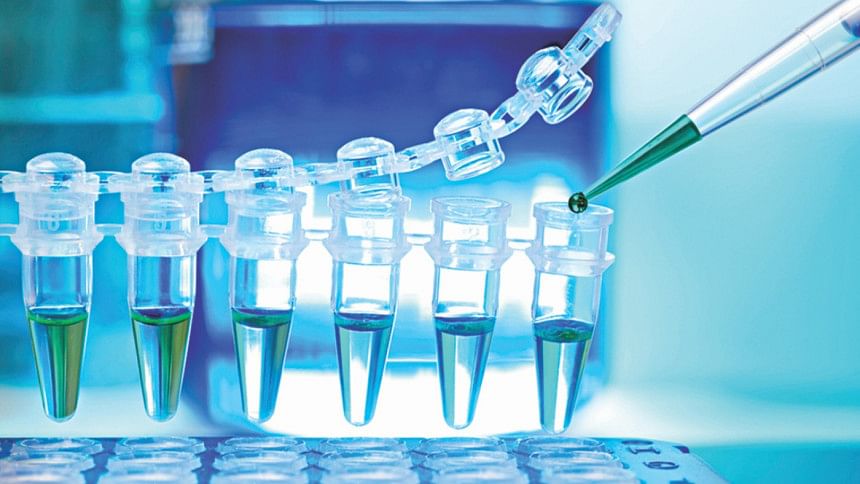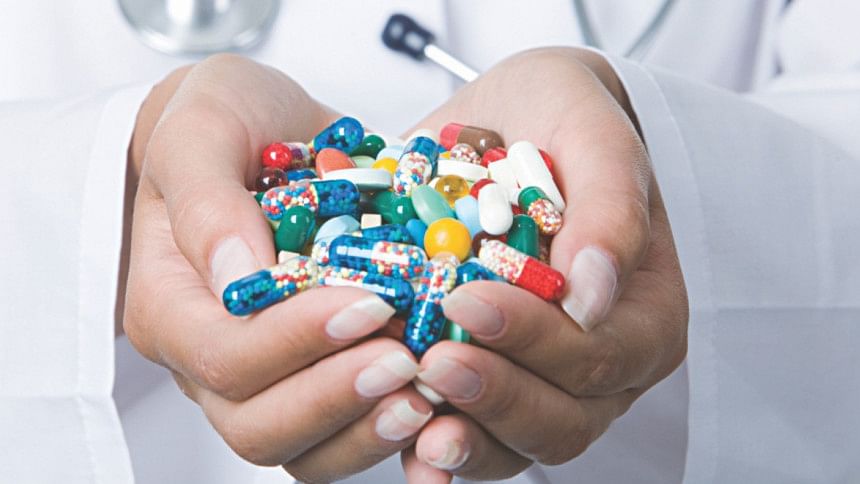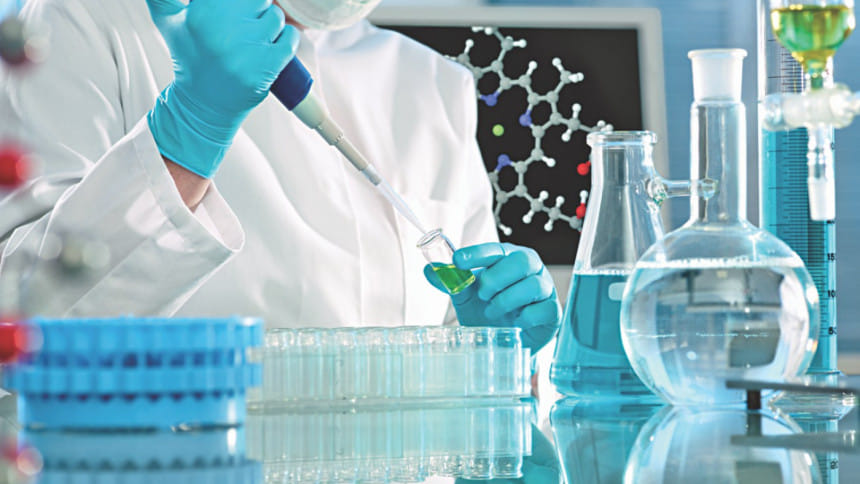Window of opportunity for the pharma industry

Bangladesh is aiming to develop 30 world-class drug makers in the next decade in order to establish a strong foothold in the global pharmaceutical markets. As a least developed country (LDC), the country is exempted from obligations to implement patents and data protection for pharmaceutical products until 2033. But as it is highly likely that the country will graduate from the LDC group by 2024, the window of opportunity for Bangladesh is thus only about 10 years. Industry people are hopeful that the country will be cultivate the 30 manufacturers within the time it can still avail of this preferential treatment.
Abdul Muktadir, Chairman of Incepta Pharmaceuticals, said the country's medicine manufacturers have been preparing to expand capacity and raise standards in the last decades. “And they will be ready to raise the curtains within a year or two,” he added.
Like the garments industry, the country's pharmaceutical sector has been one of the success stories of Bangladesh in the last three decades. The pharmaceuticals industry dates back to the 1950s. Over the years, the industry has gone through major changes. After Bangladesh's liberation in 1971, the industry was largely dominated by multi-national companies and the country was import-dependent. The defining moment came in 1982 when the government formulated the National Drug Policy and the Drug Control Ordinance. According to an analysis by the non-banking financial institution IDLC, at the time, 75% of the market was dominated by MNCs, whereas the rest was shared by some 133 local firms.
Whereas in the early 1980s, locally manufactured drug sales amounted to only BDT 100 crore, in 2014, they amounted to BDT 11,000 crore. Within two to three decades, the sector has made a complete turnaround from an import-dependent industry to almost self-sufficiency. Domestic manufactures account for 97% of the drug sales in the local market, catering to a population of 160 million, while the remaining 3% is imported.
With 160 small, medium and large enterprises in operation, experts say Bangladesh has formidable supply-side capacity in pharmaceuticals and is capable of catering to not only the sizeable domestic market, but also to the international market. The country exports about 500 pharmaceutical items, including active pharmaceutical ingredients (APIs) as well as a wide range of pharmaceutical products covering all major therapeutic classes and dosage forms, to about 100 countries.

According to the Export Promotion Bureau, pharmaceutical exports between July-December rose by 17.225% year-on-year in the current fiscal year, and in FY 2014-15 amounted to USD 72.64 million. However, these sales are tiny compared to the vast world market, estimated to be worth more than USD 520 billion in 2014.
The Bangladesh pharma industry churns out about 8,000 generic drugs under 26,813 registered brands in different dosages and strengths. The government controls the price of 209 generic drugs in specified dosage forms, along with 41 APIs produced in the country and medicine imports.
In a major development, the US Food and Drug Administration approved Square Pharmaceuticals and Beximco Pharmaceuticals, the two top companies in the country, after inspecting the oral solid dosage facilities of the two companies in Bangladesh last year. It has not only paved the way for the companies to export medicines to the US market, which is known for stringent regulations and quality standards, but it is a game-changer for the industry as a whole.
On 6th November last year, the WTO-TRIPS Council granted the least developed countries, which include Bangladesh, an exemption from obligations to implement patents and data protection for pharmaceutical products until 2033. The Trade-Related Aspects of Intellectual Property Rights (TRIPS) decision of the World Trade Organisation (WTO) has important implications for the economies of all 34 least developed member countries, as the waiver provides them with an opportunity to provide low-cost medicine to their own people, besides significant export opportunities for pharmaceutical enterprises.
With costs low thanks to the waiver, the competitive strength of LDC producers will be enhanced in both domestic and export markets. Producers, consumers and LDC economies in general should ideally reap substantial benefits as a result of this decision. But the decision has particular significance for Bangladesh. According to Mustafizur Rahman, Executive Director of the think-tank Centre for Policy Dialogue, among all the LDCs, Bangladesh is one of the few which are actually in a position to reap the benefits of this decision.
The patent exemption means the local pharmaceuticals sector is set to register a compound annual growth rate of 10% in terms of local curreny and 8.9% in terms of USD, said London-based industry analyst firm BMI Research. The report added that local firms that will benefit include key players such as Beximco, Square and Eskayef. Muktadir, however, looked at the domestic benefits of the patent waiver. He stated that we will be able to provide high-quality drugs at a very low price.
Sales of generic drugs in Bangladesh will treble to BDT 30,300 crore per year by 2024, thanks in part to the extension of the medicine patent waiver, which will make quality products more accessible. However, Bangladesh's goal of growing its pharmaceuticals sector by becoming a key medicine exporter to frontier markets will be difficult.

While there is a latent demand for medicines in the LDCs, transforming these opportunities into revenue growth has its fair share of challenges. Distribution of medical facilities remains skewed towards the urban economic centres, according to the BMI report. It added that the greatest commercial opportunities for generic drugs will lie in emerging markets. This happens as countries such as China, the Philippines and Malaysia are set to see significant improvements in healthcare access, backed by substantial public sector investment for the roll-out of universal healthcare.
In addition, regulatory standards will become stricter with time. This falls in line with the broader development of the regulatory bodies in these markets.
But according to Mollick Mahmood Hossain, Managing Director of Novelta Bestway Pharmaceuticals Ltd, there is growing demand for Bangladeshi medicines in Southeast Asia, Asia Pacific and Africa. At present, around 30 Bangladeshi pharmaceutical companies export medicines to 90 countries in Europe, Asia, Africa and Latin America. Bangladeshi companies are now focusing on developed markets such as Europe, Australia, Latin America and the Gulf countries. Top companies have already started exporting to stringently regulated markets and are getting very good responses.
Within 2017, patents of some blockbuster drugs, i.e. medicines generating global sales of at least USD 1 billion annually, will expire. As a result, the global generic market will amount to over USD 400 billion. Around 80% of the world's population consumes generic products. Moreover, in many countries, new government provisions, changing demographics and lifestyle will continue to increase the use of global generic medicines. India and China are the major players in the world generic market.
On the downside, the country still buys most of its raw materials from abroad. But developments are underway, with a number of firms now manufacturing raw materials locally. For example, the Active Pharmaceutical Ingredients Park in Munshiganj, around 40 km from the capital, is under construction at present. Once complete, the park will help the sector manufacture at an economy rate. With plans to establish around 40 API industries inside the park, including a central effluent treatment plant and incinerator amongst many other facilities, Bangladesh is surely on the road to attaining self-sufficiency and stellar export growth in the days to come.
The writer is senior staff reporter, The Daily Star.

 For all latest news, follow The Daily Star's Google News channel.
For all latest news, follow The Daily Star's Google News channel. 



Comments